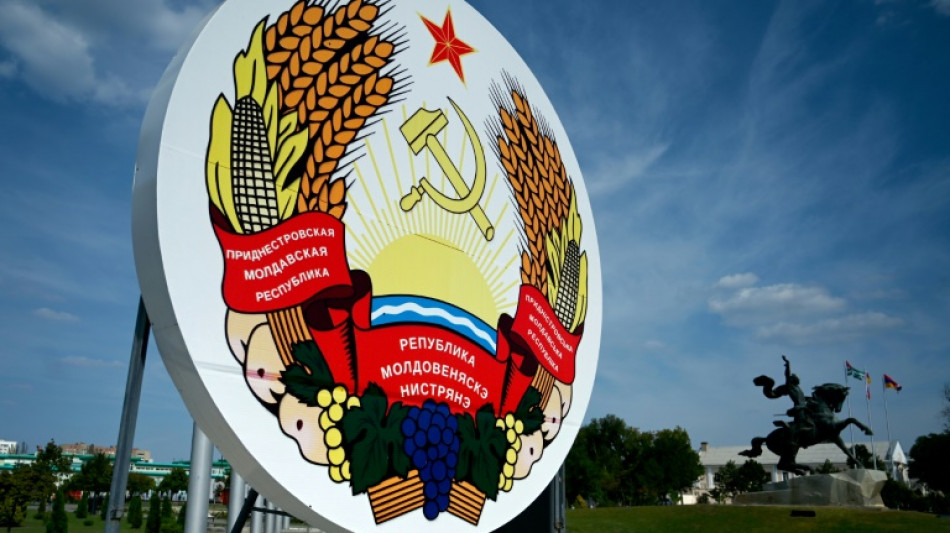
-
 Spain's Canary Islands received record 46,843 migrants in 2024: ministry
Spain's Canary Islands received record 46,843 migrants in 2024: ministry
-
Panama says migrant jungle crossings fell 41% in 2024

-
 UN experts slam Israel's 'blatant assault' on health rights in Gaza
UN experts slam Israel's 'blatant assault' on health rights in Gaza
-
Tesla reports lower 2024 auto deliveries, missing forecast

-
 Meghan Markle's lifestyle show to premiere Jan 15 on Netflix
Meghan Markle's lifestyle show to premiere Jan 15 on Netflix
-
On Bourbon Street, a grim cleanup after deadly nightmare

-
 New Orleans killer acted alone, professed loyalty to jihadist group: FBI
New Orleans killer acted alone, professed loyalty to jihadist group: FBI
-
UK's biggest dinosaur footprint site uncovered
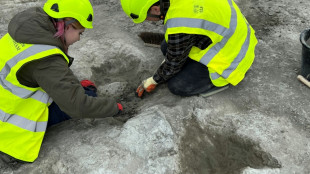
-
 Former Australia coach Langer to take charge of London Spirit
Former Australia coach Langer to take charge of London Spirit
-
Most UK doctors suffer from 'compassion fatigue': poll

-
 Everton boss Dyche unconcerned by Maupay jibe
Everton boss Dyche unconcerned by Maupay jibe
-
FBI probes potential accomplices in New Orleans truck ramming

-
 Secret lab developing UK's first quantum clock: defence ministry
Secret lab developing UK's first quantum clock: defence ministry
-
Premier League chief fears Club World Cup's impact on Man City and Chelsea

-
 US mulls new restrictions on Chinese drones
US mulls new restrictions on Chinese drones
-
Rosita Missoni of Italy's eponymous fashion house dies age 93

-
 27 sub-Saharan African migrants die off Tunisia in shipwrecks
27 sub-Saharan African migrants die off Tunisia in shipwrecks
-
UK grime star Stormzy banned from driving for nine months

-
 Neil Young dumps Glastonbury alleging 'BBC control'
Neil Young dumps Glastonbury alleging 'BBC control'
-
Swiatek battles back to take Poland into United Cup semis

-
 Electric cars took 89% of Norway market in 2024
Electric cars took 89% of Norway market in 2024
-
Rival South Korea camps face off as president holds out

-
 French downhill ace Sarrazin out of intensive care
French downhill ace Sarrazin out of intensive care
-
Djokovic cruises past Monfils as rising stars impress in Brisbane

-
 Montenegro mourns after gunman kills 12
Montenegro mourns after gunman kills 12
-
Sales surge in 2024 for Chinese EV giant BYD

-
 Agnes Keleti, world's oldest Olympic champion, dies at 103
Agnes Keleti, world's oldest Olympic champion, dies at 103
-
Andreeva, Mpetshi Perricard showcase Australian Open potential

-
 Afghan refugees suffer 'like prisoners' in Pakistan crackdown
Afghan refugees suffer 'like prisoners' in Pakistan crackdown
-
Coach tight-lipped on whether Rohit will play in final Australia Test

-
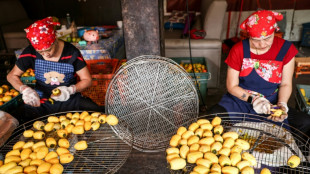 Blooming hard: Taiwan's persimmon growers struggle
Blooming hard: Taiwan's persimmon growers struggle
-
South Korea's impeached president resists arrest over martial law bid

-
 Knicks roll to ninth straight NBA win, Ivey hurt in Pistons victory
Knicks roll to ninth straight NBA win, Ivey hurt in Pistons victory
-
'Numb' New Orleans grapples with horror of deadly truck attack

-
 Asia stocks begin year on cautious note
Asia stocks begin year on cautious note
-
FBI probes 'terrorist' links in New Orleans truck-ramming that killed 15

-
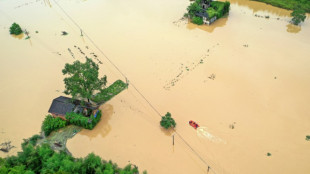 2024 was China's hottest year on record: weather agency
2024 was China's hottest year on record: weather agency
-
Perera smashes 46-ball ton as Sri Lanka pile up 218-5 in 3rd NZ T20

-
 South Korea police raid Muan airport over Jeju Air crash that killed 179
South Korea police raid Muan airport over Jeju Air crash that killed 179
-
South Korea's Yoon resists arrest over martial law bid

-
 Sainz set to step out of comfort zone to defend Dakar Rally title
Sainz set to step out of comfort zone to defend Dakar Rally title
-
New Year's fireworks accidents kill five in Germany

-
 'I'm Still Here': an ode to Brazil resistance
'I'm Still Here': an ode to Brazil resistance
-
New Orleans attack suspect was US-born army veteran

-
 Australia axe Marsh, call-up Webster for fifth India Test
Australia axe Marsh, call-up Webster for fifth India Test
-
Veganuary for Pets
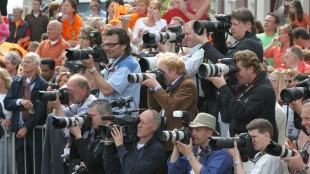
-
 Jets quarterback Rodgers ponders NFL future ahead of season finale
Jets quarterback Rodgers ponders NFL future ahead of season finale
-
Eagles' Barkley likely to sit out season finale, ending rushing record bid

-
 Syria FM hopes first foreign visit to Saudi opens 'new, bright page'
Syria FM hopes first foreign visit to Saudi opens 'new, bright page'
-
At least 10 dead in Montenegro restaurant shooting: minister

| RBGPF | -5.05% | 59.02 | $ | |
| RYCEF | 2.34% | 7.25 | $ | |
| CMSC | 1.12% | 23.19 | $ | |
| SCS | -1.11% | 11.69 | $ | |
| NGG | 0.34% | 59.62 | $ | |
| BCE | 0.05% | 23.192 | $ | |
| CMSD | 1.03% | 23.37 | $ | |
| RIO | -0.12% | 58.74 | $ | |
| GSK | 0.22% | 33.895 | $ | |
| RELX | -0.24% | 45.31 | $ | |
| BCC | -1.43% | 117.185 | $ | |
| JRI | 0.21% | 12.155 | $ | |
| BTI | 0.45% | 36.485 | $ | |
| AZN | 0.74% | 66.01 | $ | |
| BP | 0.79% | 29.795 | $ | |
| VOD | -0.13% | 8.479 | $ |

Moldova holds security talks over blasts in Russia-backed region
Ex-Soviet Moldova on Tuesday convened its security council after a series of blasts in the Russian-backed separatist Transnistria region raised fears of a spillover from the war in Ukraine.
The breakaway region saw explosions hit its security ministry on Monday and a radio tower on Tuesday morning.
President Maia Sandu was to hold a meeting of the country's Supreme Security Council "in connection with the incidents in the Transnistria region", her office said, with a press briefing to follow.
The blasts came as the conflict in Ukraine has provoked fears in Moldova that the country could become Russia's next target.
A Russian military chief last week angered Moldova by referring to "oppression" of Russian speakers in Trasnistria.
The Kremlin expressed "concern" over the blasts and Russian state news agency RIA Novosti quoted a source in the Trasnistria government as saying that attackers had entered from Ukraine.
The OSCE in Moldova tweeted that it "condemns all attempts to destabilise (the) situation" in Transnistria and its buffer zone.
Two explosions hit a radio tower re-broadcasting Russian stations near the Ukrainian border early Tuesday, the interior ministry of the breakaway region said.
The ministry said two "powerful" antennae that were re-broadcasting Russian radio were out of order, and shared images of them lying on the ground.
There were no injuries, it added.
Earlier the Transnistrian authorities said the offices of the state security ministry in Tiraspol were hit by what appeared to be a grenade-launcher attack on Monday evening.
No one was injured in the incident, which happened at around 5:00 pm on a public holiday for the Orthodox Easter.
But windows and doors were blown out in the state security ministry building and smoke was "billowing out of the buildings", the Transnistria region's interior ministry said in a statement.
Transnistria's security council also said that a military unit had been hit in the village of Parkany close to the main city of Tiraspol, regional TV reported.
- Russian speakers 'oppressed' -
Kremlin spokesman Dmitry Peskov told reporters: "We are observing closely and the news prompts concern," while declining to comment on the possible attackers.
Transnistrian leader Vadim Krasnoselsky said on Telegram that threats to the region had "become real" and "each challenge will receive an appropriate response".
The region declared a "red" level of terror threat for the next 15 days, stepping up security checks on roads and its frontier with Moldova, switching schools to remote learning and cancelling a parade commemorating World War II victory on May 9.
RIA Novosti quoted a source in the Transnistrian government as saying three unidentified individuals unofficially crossed the border from Ukraine, attacked the security ministry, then crossed back.
Transnistria is an unrecognised Moscow-backed breakaway region that seceded in 1990, followed by a short war in 1992, with the Russian army fighting alongside separatists against Moldovan forces.
The frozen conflict has seen Russia deploying troops there ever since.
The region is located about 80 kilometres (50 miles) from Moldova's capital Chisinau, bordering western Ukraine.
Moscow still has a military base there, guarding a stockpile of some 20,000 tonnes of munitions.
Chisinau has long called for the Russian troops to leave.
A senior Russian military official last week raised the issue of "oppression" of Russian speakers in Transnistria in the context of Russia's military campaign in Ukraine.
Moldova's foreign ministry summoned Russia's ambassador over the comments.
Moldova, a former Soviet republic of 2.6 million people is one of Europe's poorest countries.
President Sandu was elected in 2020 on a pro-Western programme and since the Ukraine conflict began, the country has had a flurry of visits by Western officials including US Secretary of State Antony Blinken and a financing boost from the IMF.
Unlike neighbouring Romania, Moldova is not a member of NATO. It formally requested to join the bloc in March.
R.Veloso--PC
